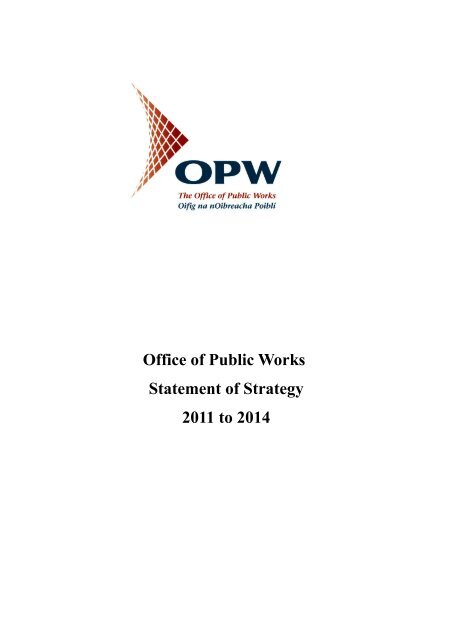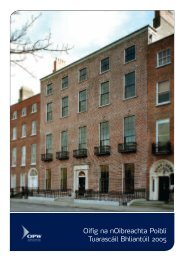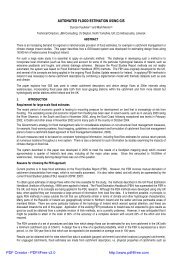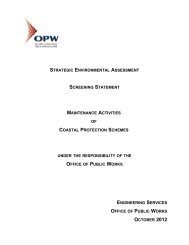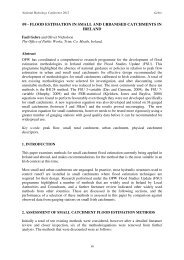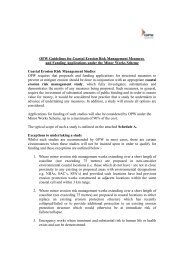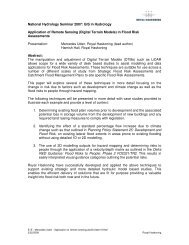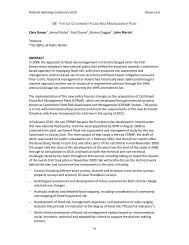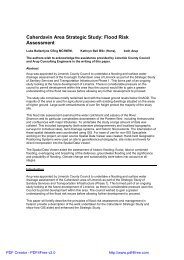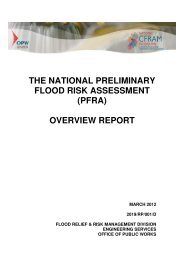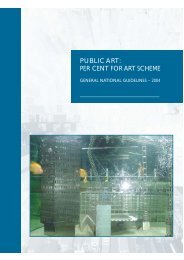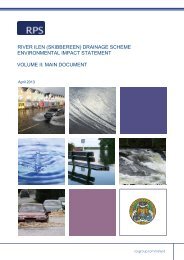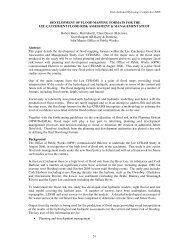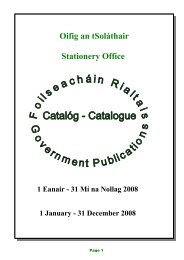Chapter 4 - Office of Public Works
Chapter 4 - Office of Public Works
Chapter 4 - Office of Public Works
Create successful ePaper yourself
Turn your PDF publications into a flip-book with our unique Google optimized e-Paper software.
<strong>Office</strong> <strong>of</strong> <strong>Public</strong> <strong>Works</strong><br />
Statement <strong>of</strong> Strategy<br />
2011 to 2014
Contents<br />
Minister's Foreword 4<br />
Chairman's Foreword 5<br />
<strong>Chapter</strong> 1 - Mission Statement, Mandate and Vision<br />
1.1– Mission 6<br />
1.2- Mandate 6<br />
1.3- Functions and Visions 6<br />
1.3.1 - Estate Portfolio Management 6<br />
1.3.2 - Flood Risk Management 7<br />
1.3.3- National Procurement Service 7<br />
1.3.4- Corporate Services 8<br />
<strong>Chapter</strong> 2 - Analysis <strong>of</strong> Organisational Operating Environment<br />
2.1- Regulatory Environment 9<br />
2.2- Structure <strong>of</strong> the OPW 10<br />
2.2.1 - Management Structure 10<br />
2.2.2 - Staffing and Location <strong>of</strong> the OPW 11<br />
2.3 - Internal Environment 11<br />
2.3.1 - Our People 11<br />
2.3.2 - Financial Resource Allocation 13<br />
2.3.3 - Cost Control 13<br />
2.3.4- Procurement 13<br />
2.3.5- Corporate Governance 13<br />
2.4 - External Environment 13<br />
2.4.1 - Economic Environment 13<br />
2.4.2 - Reduction in <strong>Public</strong> Service Numbers 14<br />
2.4.3 - Comprehensive Expenditure Review 14<br />
2.4.4 - <strong>Public</strong> Service Reform 14<br />
2.4.5 - <strong>Public</strong> Service Agreement 2010 – 2014 - Croke Park Agreement 15<br />
2.5- Cross-Departments/Organisations Environment 15<br />
2.5.1 - Flood Risk Management 15<br />
2.5.2 - Property Related Matters 16<br />
2.5.3 - Procurement 16<br />
2.5.4 - Government Architectural Policy 17<br />
2<br />
Page
2.5.5 - National Climate Change Strategy 2007 – 2012 17<br />
2.5.6 - Optimising Power @ Work 18<br />
2.5.7- Ireland's Presidency <strong>of</strong> the EU in 2013 18<br />
<strong>Chapter</strong> 3 – Monitoring and Reviewing 19<br />
<strong>Chapter</strong> 4 - Objectives, Actions, Outputs and Outcomes 20<br />
Appendix - OPW Top Level Management Structure 35<br />
3
Minister's Foreword<br />
The <strong>Office</strong> <strong>of</strong> <strong>Public</strong> <strong>Works</strong> is in the positive position <strong>of</strong> being able to make a real contribution to<br />
the economic recovery <strong>of</strong> our county. This Statement <strong>of</strong> Strategy sets out the <strong>Office</strong>'s high-level<br />
goals for the next three years. These goals are aimed at focussing the <strong>Office</strong>'s contribution to<br />
Government policy in general and in the area <strong>of</strong> public sector reform in particular.<br />
The Government is committed to public sector reform and obtaining maximum efficiencies from,<br />
and reducing the size <strong>of</strong>, the public service. There is no doubt that reform and change will be<br />
constant requirements for the OPW as an organisation over the next few years. There will be a<br />
continuing pressure on the <strong>Office</strong> to deliver more with decreasing resources. Fortunately, the OPW<br />
is well placed to assist in the delivery <strong>of</strong> reform over the public sector generally. The <strong>Office</strong> aims to<br />
play a significant role in delivering modern public services more efficiently and more imaginatively,<br />
over the course <strong>of</strong> this 3-year plan.<br />
The <strong>Office</strong>'s three main business activities are Estate Portfolio Management, Procurement and<br />
Flood Risk Management (all supported by Corporate Services) and improvements in these functions<br />
will impact in a positive way on the reform processes that are taking place across the public service<br />
as a whole. In the area <strong>of</strong> Estate Portfolio Management, the Government's aim is to deliver greater<br />
value through more efficient management <strong>of</strong> the Government estate. A smaller public service will<br />
require a smaller physical property footprint and the OPW will play a leading role in achieving this<br />
rationalisation. Since it was established in OPW in 2009, the National Procurement Service has<br />
aimed, through the provision <strong>of</strong> pr<strong>of</strong>essional procurement services and advice, to ensure that the<br />
public service can efficiently and effectively access the best value goods and services in a legally<br />
compliant manner, thus enabling the provision <strong>of</strong> superior public services. The Government has<br />
allocated €45 million per annum for flood risk management and mitigation in the Infrastructure and<br />
Capital Investment Medium Term Exchequer Framework for the period 2012 – 2016. At a time<br />
when difficult decisions have been made in order to adhere to the current severe financial<br />
constraints, this very substantial allocation underlines the Government's recognition <strong>of</strong> the serious<br />
and economic impact <strong>of</strong> flooding and the importance it attaches to addressing the problem.<br />
Since taking up my role here in the OPW, I have been impressed by the team <strong>of</strong> staff working in this<br />
organisation and their pr<strong>of</strong>essionalism, openness and commitment to change. I look forward to<br />
working with them on delivering the ambitious objectives laid out in this Statement <strong>of</strong> Strategy.<br />
BBrian Hayes, T.D<br />
Minister <strong>of</strong> State<br />
4
Chairman's Foreword<br />
The <strong>Office</strong> <strong>of</strong> <strong>Public</strong> Work's (OPW) remit covers three main functional areas <strong>of</strong> Estate Portfolio<br />
Management including Heritage Services, Flood Risk Management and the National Procurement<br />
Service. This Statement <strong>of</strong> Strategy sets out the objectives <strong>of</strong> the OPW in its areas <strong>of</strong> responsibility<br />
for the years 2011 to 2014.<br />
In relation to Estate Portfolio Management we aim to be the recognised leader in, and set the<br />
standard for, the management and conservation <strong>of</strong> our buildings and heritage. Efforts to rationalise<br />
our property portfolio, reduce maintenance costs and release properties will be a priority.<br />
Opportunities to present our Heritage Sites to greater numbers and using new technologies will be<br />
explored.<br />
The OPW is the lead agency for flood risk management in Ireland. It is our aim to minimise the<br />
impacts <strong>of</strong> flooding on society, households and businesses, through sustainable planning, guidance,<br />
information and effective measures for areas at risk from flooding.<br />
<strong>Public</strong> procurement is essential for effective public service and good governance. The National<br />
Procurement Service (NPS) is a shared service provided by the OPW and its function is to achieve<br />
greater efficiencies and value for money in the procurement <strong>of</strong> common goods and services for the<br />
Irish public service. It is our aim that the NPS will be the procurement service provider <strong>of</strong> choice<br />
for public sector bodies<br />
These functional areas place us at the centre <strong>of</strong> the Government's public sector reform goals. The<br />
Government <strong>Public</strong> Sector Reform Plan addresses a wide range <strong>of</strong> issues such as:<br />
• implementation <strong>of</strong> shared services models for HR, payroll, pensions etc;<br />
• evaluation <strong>of</strong> new business models for the delivery <strong>of</strong> non-core services;<br />
• reform <strong>of</strong> public procurement processes and property rationalisation; and<br />
• reducing costs, addressing duplication and eliminating waste to support job creation.<br />
The OPW has set out its objectives and plans for achieving reform in all <strong>of</strong> these areas. In<br />
conjunction with delivering the objectives set out in this Statement <strong>of</strong> Strategy , staff in the OPW<br />
will on an ongoing basis, examine every aspect and function <strong>of</strong> the business activities being carried<br />
out and identify opportunities for greater effectiveness and efficiency. We are restructuring the<br />
<strong>Office</strong> to ensure that these efficiencies will be delivered.<br />
The OPW has been charged with leading the operational aspects <strong>of</strong> the public service reform agenda<br />
in the areas <strong>of</strong> public procurement processes and property rationalisation. While this will be a<br />
challenge for us over the coming three years I know that our staff are more than equal to the<br />
challenges that face us and that we can draw on the resilience, flexibility and diligence <strong>of</strong> all within<br />
the OPW to ensure that greater value for money is provided for the taxpayer in all our areas <strong>of</strong><br />
operation.<br />
Clare McGrath<br />
Chairman<br />
5
1.1 Mission<br />
<strong>Chapter</strong> 1<br />
Mission Statement, Mandate and Vision<br />
Mission Statement<br />
The mission <strong>of</strong> the <strong>Office</strong> <strong>of</strong> <strong>Public</strong> <strong>Works</strong> is to use our experience and expertise in our<br />
mandated areas <strong>of</strong> operation to provide innovative, effective and sustainable shared services<br />
1.2 Mandate<br />
to the public and our clients.<br />
The core functions <strong>of</strong> the <strong>Office</strong> <strong>of</strong> <strong>Public</strong> <strong>Works</strong> (OPW) relate to three areas <strong>of</strong> operation i.e.<br />
Flood Risk Management<br />
Procurement and<br />
Estate Portfolio Management<br />
and these operational areas are supported by Corporate Services.<br />
The OPW is primarily concerned with the delivery <strong>of</strong> services to customers. Its ethos is client focus<br />
and providing value for money for the taxpayer while delivering in a timely manner and being alert<br />
to sustainability issues.<br />
Our customers are the public, Government, other Departments, <strong>Office</strong>s, Agencies and the wider<br />
public service.<br />
1.3 Functions and Vision<br />
1.3.1 Estate Portfolio Management<br />
The OPW provides a shared service in the area <strong>of</strong> property management and property maintenance<br />
incorporating architectural, engineering, valuation, quantity surveying, project management and<br />
facilities management services to central Government Departments and Agencies. OPW is the<br />
leading agency in the country in the areas <strong>of</strong> conservation and the presentation <strong>of</strong> cultural and<br />
heritage properties. The <strong>Office</strong> is responsible for some 780 National Monuments such as<br />
6
Newgrange and the Rock <strong>of</strong> Cashel. It also manages some <strong>of</strong> the most prestigious Historic<br />
Properties in the Country, e.g. Dublin Castle and Castletown House.<br />
Vision<br />
To be the recognised leader in, and set the standard for the management and conservation<br />
<strong>of</strong> our buildings and heritage.<br />
1.3.2 Flood Risk Management<br />
The OPW is the lead agency for flood risk management in Ireland. It is, therefore, responsible for<br />
developing and implementing comprehensive policies and strategies for flood risk management.<br />
The primary functions <strong>of</strong> this programme are:<br />
- to develop and deliver on flood risk management work programmes and measures;<br />
- to maintain an effective programme <strong>of</strong> maintenance <strong>of</strong> river courses drained under the<br />
provisions <strong>of</strong> the Arterial Drainage Acts: and<br />
- to advise the Government on flood risk management and flood risk management policy.<br />
Vision<br />
To minimise the impacts <strong>of</strong> flooding on society; households and businesses, through<br />
sustainable planning, guidance, information and effective measures for areas at risk from<br />
flooding.<br />
1.3.3 National Procurement Service (NPS)<br />
<strong>Public</strong> procurement is essential for effective public service and good governance. The NPS is a<br />
shared service provided by the OPW and its function is to achieve greater efficiencies and value for<br />
money in the procurement <strong>of</strong> common goods and services for the Irish public service.<br />
Vision<br />
To be the procurement service provider <strong>of</strong> choice for public sector bodies.<br />
7
1.3.4 Corporate Services<br />
The above areas <strong>of</strong> activity are supported internally by Corporate Services which include functions<br />
such as Human Resource Management and Development, Financial Management, Information &<br />
Communication Technology and other services necessary for the day to day operations <strong>of</strong> the<br />
<strong>Office</strong>.<br />
Vision<br />
To maximise the capability and capacity <strong>of</strong> our staff to deliver on the Strategic Objectives<br />
<strong>of</strong> the organisation. We will apply the dedication, pr<strong>of</strong>essionalism and integrity that has<br />
been the hallmark <strong>of</strong> our organisation for over a hundred and seventy years to all our<br />
activities.<br />
8
<strong>Chapter</strong> 2<br />
Analysis <strong>of</strong> Organisational Operating Environment<br />
The OPW responds to and is affected in its day to day business by Government policies, economic<br />
circumstances and prevailing trends in its area <strong>of</strong> operations.<br />
The OPW, as an organisation providing shared services, has a strong customer focus and as a result<br />
the majority <strong>of</strong> its staff are employed in operational and front line areas responding to customer<br />
needs. Our customers are the public, Government, other Departments, <strong>Office</strong>s and Agencies and<br />
the wider public service. A consultation process with our customers and clients formed part <strong>of</strong> the<br />
development <strong>of</strong> our Statement <strong>of</strong> Strategy.<br />
2.1 Regulatory Environment<br />
The legal framework within which the OPW operates and which guides the specific core activities<br />
carried out by the <strong>Office</strong> is set out principally in the following enactments:<br />
<strong>Public</strong> <strong>Works</strong> Act, 1831<br />
State Property Act, 1954.<br />
Coast Protection Act, 1963.<br />
State Authorities (Development and Management) Act, 1993.<br />
Arterial Drainage Acts, 1945 to 1995.<br />
Commissioners <strong>of</strong> <strong>Public</strong> <strong>Works</strong> (Functions and Powers) Act, 1996.<br />
National Monuments Acts, 1930 to 2004.<br />
European Communities (Energy End-use Efficiency and Energy Services) Regulations 2009<br />
- S.I. No. 542/2009<br />
European Communities (Assessment and Management <strong>of</strong> Flood Risks) Regulations 2010 -<br />
S.I. No. 122/2010.<br />
This body <strong>of</strong> legislation confers relevant powers in relation to the OPW on the Minister for <strong>Public</strong><br />
Expenditure & Reform and that Minister remains the legal head and the ultimate political authority<br />
in respect <strong>of</strong> the <strong>Office</strong>.<br />
In common with other Departments and Agencies <strong>of</strong> State, the OPW is also subject to the<br />
provisions <strong>of</strong> legislation such as:-<br />
Ministers and Secretaries Acts 1924 to 2011<br />
9
Civil Service Regulation Acts 1923 to 2005,<br />
Data Protection Acts 1988 and 2003,<br />
Building Control Acts 1990 and 2007,<br />
Ethics in <strong>Public</strong> <strong>Office</strong> Acts, 1995 and 2001,<br />
Prompt Payment <strong>of</strong> Accounts Act, 1997,<br />
<strong>Public</strong> Service Management Act, 1997<br />
Freedom <strong>of</strong> Information Acts 1997 and 2003,<br />
Planning and Development Acts 2000 to 2010,<br />
Officials Languages Act, 2003.<br />
Legislation in the areas <strong>of</strong> employment, equality, health & safety, environment, and procurement<br />
also form significant parts <strong>of</strong> the OPW's legal framework. In particular, legislation such as the<br />
Disability Act 2005, the Safety, Health and Welfare at Work Act 2005 and its regulations and EU<br />
Directives and Regulations in the area <strong>of</strong> procurement impact on the day to day operations <strong>of</strong> the<br />
OPW.<br />
2.2 Structure <strong>of</strong> the OPW<br />
2.2.1 Management Structure<br />
The OPW’s top management structure is organised around the interlinking entities <strong>of</strong> the Board and<br />
the Management Advisory Committee. This group reports to the Minister <strong>of</strong> State at the<br />
Department <strong>of</strong> <strong>Public</strong> Expenditure & Reform with special responsibility for the OPW and through<br />
the Minister for <strong>Public</strong> Expenditure & Reform to the Government.<br />
The Board comprises the Chairman and two Commissioners and is the legal entity referred to in<br />
relevant legislation and regulations concerning the Commissioners <strong>of</strong> <strong>Public</strong> <strong>Works</strong>.<br />
The Board and the Directors <strong>of</strong> Architectural Services, Engineering Services, NPS and Corporate<br />
Services comprise the Management Advisory Committee (MAC). The MAC is the Top<br />
Management group which advises the Minister <strong>of</strong> State on policy and directs the normal activities<br />
and functions <strong>of</strong> the <strong>Office</strong>.<br />
2.2.2 Staffing and Location <strong>of</strong> the OPW<br />
The OPW has over 1,800 staff made up <strong>of</strong> pr<strong>of</strong>essional, technical, industrial and administrative<br />
grades. Our staff are stationed in 138 workplaces throughout the country and our headquarters is in<br />
Trim, Co. Meath. The geographical spread <strong>of</strong> the OPW's staff and workplaces is reflective <strong>of</strong> the<br />
10
varied and localised nature <strong>of</strong> our services, particularly in the areas <strong>of</strong> Estate Portfolio Management<br />
and Flood Risk Management.<br />
The Structure <strong>of</strong> the Organisation from Senior Management level upwards is outlined in the Chart<br />
at Appendix 1.<br />
2.3 Internal Environment:<br />
2.3.1 Our People<br />
The <strong>Office</strong>’s principal asset in the delivery <strong>of</strong> quality service is the pr<strong>of</strong>essionalism and expertise <strong>of</strong><br />
its staff across a very wide skills spectrum. It is a prime objective that staff be trained to the highest<br />
levels and that they are familiar with best practice in areas related to the OPW's core functions.<br />
Staff are also facilitated and encouraged to acquire relevant pr<strong>of</strong>essional training in areas such as<br />
procurement, estate management, etc. A special emphasis is placed on the continuing pr<strong>of</strong>essional<br />
development <strong>of</strong> pr<strong>of</strong>essional and technical staff. Adequate time and resources are provided to give<br />
appropriate training in all aspects <strong>of</strong> their work in the areas <strong>of</strong> changing technology, legislative<br />
enactments and EU Directives.<br />
The OPW sustains a positive approach to the Partnership model as a vehicle for improving<br />
communication and ensuring staff input into policy development.<br />
The OPW is committed to ensuring equality <strong>of</strong> opportunity within the organisation and to<br />
proactively promoting awareness and best practice in this area across the <strong>Office</strong>.<br />
2.3.2 Financial Resource Allocation<br />
In common with all Government Departments and central <strong>Office</strong>s most <strong>of</strong> the OPW's annual<br />
funding allocation is authorised by the Dáil and is referred to as Voted allocation. The gross Voted<br />
allocation for the OPW in 2011 and estimated Voted allocation for the period 2012 – 2014 is as<br />
shown in the table at the top <strong>of</strong> the next page. These funds are allocated to the OPW to carry out its<br />
three core functions <strong>of</strong> Estate Portfolio Management, Flood Risk Management and National<br />
Procurement Service (NPS).<br />
11
2011 2012 2013 2014<br />
Capital Allocation €119m €120m €120m €120m<br />
Current Allocation €286m €286m €286m €286m<br />
Current Reduction<br />
Sought<br />
Reduced Current<br />
Allocation<br />
€5m €9m €13m<br />
€281m €277m €273m<br />
OPW services are generally delivered from Voted funds. The OPW Vote, however, does not<br />
represent the full scope <strong>of</strong> OPW activities. A significant element <strong>of</strong> funding is also managed on<br />
behalf <strong>of</strong> other Departments using monies voted directly to them by the Dáil and therefore not<br />
specifically included here. These were valued at €102m in 2010. In addition the NPS has put<br />
Centralised/Framework Contracts in place valued, at present, in excess <strong>of</strong> €400 million per annum.<br />
The <strong>Office</strong> also provides services over and above our main functions:-<br />
Advising on architectural matters including feasibility and planning studies; conservation<br />
and historic evaluations and client brief developments.<br />
Developing sustainable energy options.<br />
Conducting universal access audits.<br />
Services in Health and Safety<br />
Sourcing, assessment and acquisition <strong>of</strong> sites for primary schools<br />
Management and design <strong>of</strong> major construction and procurement projects on behalf <strong>of</strong> other<br />
Agencies and Departments<br />
Art Management within the State portfolio<br />
Administration <strong>of</strong> the Local Loans Fund<br />
These functions demonstrate and reinforce the shared service nature <strong>of</strong> the <strong>Office</strong>. The provision <strong>of</strong><br />
these services is facilitated and enabled by the flexibility, cross functional capacity and capability <strong>of</strong><br />
the OPW staffing cadre.<br />
12
2.3.3 Cost Control<br />
The OPW supports a consistent approach to identifying value for money outcomes through its<br />
Financial and Management Information Systems. These allow managers to closely monitor<br />
progress, including financial performance, against targets and projections. The <strong>Office</strong> also operates<br />
sophisticated project & expenditure planning and monitoring & forecasting systems at Business<br />
Unit level.<br />
2.3.4 Procurement<br />
The OPW aims to secure optimum value for money through the utilisation <strong>of</strong> best practice<br />
procurement processes across the <strong>Office</strong> as a whole. It will use the tools provided by the NPS in the<br />
areas <strong>of</strong> framework contracts, standardised legal documents, eprocurement and collaboration with<br />
other public service bodies to achieve this aim.<br />
2.3.5 Corporate Governance<br />
The OPW places very significant emphasis on corporate governance and ensuring that an<br />
appropriate control environment is in place in the <strong>of</strong>fice. Management responsibilities in this area<br />
are clearly defined and processes are in place to identify business risks and to evaluate their<br />
financial implications. The Organisation aims to provide an objective and independent appraisal <strong>of</strong><br />
the governance, risk management and control arrangements <strong>of</strong> all the OPW activities, financial or<br />
otherwise. This is achieved by assessing whether controls are appropriate to achieve the<br />
organisational objectives and are operating as intended. An audit committee <strong>of</strong> two external<br />
members and a member <strong>of</strong> MAC is in place.<br />
2.4 External Environment<br />
2.4.1 Economic Environment<br />
As part <strong>of</strong> the budgetary correction process over the past number <strong>of</strong> years the OPW, like all other<br />
Government Departments and Agencies, has experienced reductions in all areas <strong>of</strong> expenditure.<br />
The OPW Vote allocation has been severely cut in recent years and it has endured an overall drop in<br />
capital funding <strong>of</strong> almost 70% since 2008. The <strong>Office</strong> therefore has had to re-visit its priorities and<br />
the priorities <strong>of</strong> its clients and refocus its reduced resources based on those priorities, while at the<br />
same time maintaining a large and diverse portfolio <strong>of</strong> 1 million square metres and 780 heritage<br />
properties. The budgetary adjustments within OPW have been achieved in line with the action plan<br />
arising from the <strong>Public</strong> Service Agreement 2010 – 2014 known as the Croke Park Agreement. The<br />
<strong>Office</strong> will continue to identify and implement savings across all areas <strong>of</strong> operations.<br />
13
2.4.2 Reduction in <strong>Public</strong> Service Numbers<br />
An Employment Control Framework has been introduced in the <strong>Public</strong> Service which will see an<br />
average annual reduction <strong>of</strong> approximately 3,300 in the number <strong>of</strong> serving public servants over<br />
2011 to 2014. As part <strong>of</strong> this framework the OPW is required to reduce its staffing by 69 in the<br />
period 2011 to 2014 from 1893 at the beginning <strong>of</strong> 2011 to 1824 at the end <strong>of</strong> 2014. A moratorium<br />
on recruitment is in place and recruitment <strong>of</strong> replacements when staff resign or retire is only<br />
considered in very exceptional circumstances. The challenge for the OPW is to continue to deliver<br />
services to a high standard with fewer people and less resources.<br />
2.4.3 Comprehensive Expenditure Review<br />
The Government has charged each Government Department and <strong>Office</strong> with carrying out a<br />
Comprehensive Expenditure Review to identify expenditure programme savings and scope for<br />
savings arising from efficiency and other reforms. The OPW has reviewed its own functions and<br />
activities to align them with the reduced resources available and to ensure allocations are directed<br />
towards investments which can have the greatest economic and social impact. However, the OPW<br />
must be cognisant <strong>of</strong> its key role in providing shared services to Government Departments and<br />
Agencies in the areas <strong>of</strong> accommodation, procurement and flood risk management. While<br />
efficiencies and savings must be introduced it must also continue to provide those shared services<br />
and to protect essential resources as far as possible. The heritage services provided by the OPW are<br />
regarded as fundamental to Ireland's tourism <strong>of</strong>fering. It is critical that the <strong>Office</strong> continues to<br />
provide those amenities to the high standards that have become synonymous with that area <strong>of</strong> our<br />
mandate.<br />
2.4.4 <strong>Public</strong> Service Reform<br />
The Programme for Government sets out an ambitious programme <strong>of</strong> <strong>Public</strong> Service reform. This<br />
has implications for strategy development in the OPW in a number <strong>of</strong> important areas, among these<br />
are:-<br />
Reform Agenda - The <strong>Public</strong> Service Agreement 2010 – 2014 (Croke Park ) will be a cornerstone <strong>of</strong><br />
the public service reform agenda and the OPW has an Action Plan for its implementation within the<br />
<strong>Office</strong>.<br />
State Assets – The OPW is pursuing a policy <strong>of</strong> rationalisation <strong>of</strong> <strong>of</strong>fice accommodation particularly<br />
within the greater Dublin area, with a view to achieving significant savings in rent through lease<br />
surrenders. There will also be benefits in reduced operating costs arising from energy savings.<br />
14
Labour Market Policy - The OPW can contribute to the Governments objectives in this area by<br />
participating as an employer in the area <strong>of</strong> training and work experience and in particular by<br />
providing vocational opportunities for graduates and craftworkers.<br />
E-Government – The OPW will move to provide more services on-line particularly in the area <strong>of</strong><br />
procurement, tourism and flood risk information.<br />
Supporting Small and Medium Enterprises - The OPW is cognisant <strong>of</strong> the needs <strong>of</strong> Small and<br />
Medium Enterprises and the fact that they are a very important part <strong>of</strong> the national economy.<br />
Initiatives are in place and will be developed in the area <strong>of</strong> procurement to implement Government<br />
policy in this regard, while ensuring that we adhere to national and EU procurement directives and<br />
regulations.<br />
Improving the Tourism product – The OPW is improving the visitor experience in this area by<br />
developing our e-capability in this area e.g. on-line booking, apps, exploitation <strong>of</strong> social media such<br />
as Facebook, Twitter etc. OPW will further develop relationships with tourism bodies and foster<br />
partnerships to promote our Visitor attractions in the area <strong>of</strong> culture and niche tourism.<br />
National Development Plan 2012-2019 – There will be opportunity for the OPW to assist in the<br />
implementation <strong>of</strong> the National Development Plan by providing a shared service to other public<br />
service bodies in the area <strong>of</strong> estate portfolio management.<br />
2.4.5 <strong>Public</strong> Service Agreement 2010 – 2014 - Croke Park Agreement<br />
In 2010 the Croke Park Agreement covering the period 2010-2014 was reached between public<br />
service unions and staff associations and Government. This agreement focusses on the needs <strong>of</strong> the<br />
citizen and aims to work together to build an increasingly integrated <strong>Public</strong> Service which is leaner<br />
and more effective. The OPW's management and staff are committed to implementing this<br />
agreement internally and have agreed an Action Plan to achieve this. The plan identifies the need<br />
for flexibility and mobility and demonstrates a willingness to work together across organisational<br />
and pr<strong>of</strong>essional boundaries. It is on target for successful implementation within the organisation.<br />
2.5 Cross-Departments/Organisations Environment<br />
2.5.1 Flood Risk Management<br />
The OPW is the lead statutory body in relation to Flood Risk Management in the State. The OPW<br />
works with the Department <strong>of</strong> Environment, Community and Local Government, Department <strong>of</strong><br />
Agriculture, Fisheries and Food, Local Authorities and other public bodies to ensure that flood risk<br />
is addressed in an effective manner.<br />
15
Flood risk management is aimed at mitigating the negative effects <strong>of</strong> flooding in the future. This<br />
involves sustainable planning, guidance and information provision and minimising existing risk.<br />
Risk minimisation is achieved through measures to reduce the occurrence and impact <strong>of</strong> flooding on<br />
human health, the environment, cultural heritage and economic and social activities.<br />
The OPW is the competent authority for the implementation <strong>of</strong> EU Directive 2007/60/EC on the<br />
assessment and management <strong>of</strong> flood risks. This Directive aims to reduce and manage the risks that<br />
floods pose to human health, the environment, cultural heritage and economic activity. The<br />
Directive requires Member States to first carry out a preliminary assessment by 2011 to identify the<br />
river basins and associated coastal areas at risk <strong>of</strong> flooding. For such zones flood risk maps should<br />
be drawn up by 2013 and flood risk management plans focused on prevention, protection and<br />
preparedness established by 2015. The Directive applies to inland and coastal waters across the<br />
whole territory <strong>of</strong> the EU.<br />
The initial work programme to deliver the Flood Risk Management programme is the Catchment<br />
Flood Risk Assessment and Management (CFRAM) process. The output from a CFRAM study is a<br />
Flood Risk Management Plan. This includes identification <strong>of</strong> existing and future flood risk, flood<br />
maps and a prioritised set <strong>of</strong> measures to manage the risk in the river catchment, assigning<br />
responsibilities to OPW, Local Authorities and other bodies as appropriate.<br />
2.5.2 Property Related Matters<br />
The OPW provides a shared service <strong>of</strong> Estate Portfolio Management for all Government<br />
Departments and central Government Agencies. The efficient and effective use <strong>of</strong> <strong>of</strong>fice space is a<br />
matter which the OPW has identified as an area in which better value for money can be achieved.<br />
After the cost <strong>of</strong> personnel, the provision <strong>of</strong> staff accommodation is the single highest element in<br />
administrative overheads. The OPW is proceeding to rationalise accommodation provision within<br />
its remit. The rationalisation <strong>of</strong> the State property portfolio will be brought about through<br />
consultation with and cooperation from our client Department and Agencies.<br />
2.5.3 Procurement<br />
The Programme for Government outlined the intention to rationalise core processes that are<br />
duplicated across the public service, by establishing shared back-<strong>of</strong>fice operations for a number <strong>of</strong><br />
areas, including procurement. Procurement therefore, is a strategically important area for all<br />
16
Departments and <strong>Office</strong>s. Increasingly the trend is towards the Irish <strong>Public</strong> Service being viewed as<br />
a single customer rather than a series <strong>of</strong> disparate groupings or bodies. The establishment <strong>of</strong> the<br />
NPS <strong>of</strong> the OPW is part <strong>of</strong> an overall vision for <strong>Public</strong> Procurement which sees policy and<br />
operational structures working together. The NPS has been tasked with centralising public sector<br />
procurement arrangements for common goods and services (excluding the construction sector). By<br />
identifying key markets and analysing procurement trends, the NPS will develop a more integrated<br />
approach to procurement across the public sector utilising procurement tools such as aggregation<br />
and framework agreements. This approach is achieving real savings and value for money.<br />
2.5.4 Government Architectural Policy<br />
Arising from his established mandate as the adviser to the President and Government on<br />
architectural matters the State Architect and Principal Architect at the OPW will, as set out in the<br />
Government Policy on Architecture 2009 - 2015:<br />
• contribute on the Government Construction Contracts Committee to developing<br />
procurement and contracting policies in support <strong>of</strong> architectural quality in State funded<br />
projects;<br />
• act as a consultee regarding legislation and regulations affecting quality in architecture and<br />
the built environment;<br />
• act as a consultee regarding the design quality <strong>of</strong> all infrastructural programmes;<br />
• advise the relevant Departments on the care <strong>of</strong> monuments; and the conservation, restoration<br />
and re-use <strong>of</strong> historic buildings.<br />
2.5.5 National Climate Change Strategy 2007 - 2012<br />
The National Climate Change Strategy points out that 'the public sector as the biggest<br />
landowner, property owner and tenant has a key leadership role in adopting high energy efficiency<br />
standards and practices that can lead by example and drive change through the wider community.<br />
The OPW is a leading stakeholder in carrying out this leadership role. It also plays an important<br />
role in creating markets and supply chains for renewable technologies, through setting high<br />
standards <strong>of</strong> energy efficiency in its public procurement <strong>of</strong> goods and services'. The OPW is<br />
committed to incorporating principles <strong>of</strong> sustainable design and energy efficiency into all <strong>of</strong> its<br />
building projects in line with Government Policy on Sustainable Design and its commitments to the<br />
Kyoto Protocol, the National Biodiversity Plan and the Government Policy on Architecture. The<br />
OPW's role in Flood Risk Management also recognises the potential impacts arising from Climate<br />
Change.<br />
17
2.5.6 Optimising Power @ Work<br />
Optimising Power @ Work is a civil service-wide staff energy awareness campaign involving<br />
buildings in the OPW property portfolio. The current initiative aims to achieve Carbon Dioxide<br />
(CO2) emissions reductions averaging 20%. This work is being carried out in compliance with S.I.<br />
No. 542/2009 - European Communities (Energy End-use Efficiency and Energy Services)<br />
Regulations 2009 and to assist in the implementation <strong>of</strong> The National Energy Efficiency Action<br />
Plan 2009 – 2020.<br />
2.5.7 Ireland's Presidency <strong>of</strong> the EU in 2013<br />
On 1st January 2013, Ireland will assume the Presidency <strong>of</strong> the European Union for the seventh<br />
time. The OPW will play a significant role in the provision and procurement <strong>of</strong> accommodation,<br />
facilities and event management services required by Government Departments and Agencies<br />
during the EU Presidency. This will afford the OPW an excellent opportunity to showcase some <strong>of</strong><br />
our unique Historic and Heritage properties to an international audience.<br />
18
<strong>Chapter</strong> 3<br />
Monitoring and Reviewing<br />
Section 4 <strong>of</strong> the <strong>Public</strong> Service Management Act requires the Chairman <strong>of</strong> the OPW to provide<br />
progress reports to the Minister for <strong>Public</strong> Expenditure & Reform on the implementation <strong>of</strong> the<br />
strategy statement annually or at such intervals as the Government may by order from time to time<br />
direct. A Strategic Review is included in Annual Reports <strong>of</strong> the OPW which are submitted to the<br />
Minister <strong>of</strong> State with responsibility for the OPW, the Minister for <strong>Public</strong> Expenditure & Reform,<br />
the library <strong>of</strong> the Houses <strong>of</strong> the Oireachtas and published on our website www.opw.ie.<br />
The objectives set out in this strategy feed into the annual business planning processes <strong>of</strong> the<br />
various units within the OPW. These business plans are reviewed on an ongoing basis within those<br />
units. Business Plans inform Annual Role Pr<strong>of</strong>iles <strong>of</strong> all staff which are reviewed six monthly as<br />
part <strong>of</strong> the Performance Management and Development System <strong>of</strong> the <strong>Office</strong>.<br />
19
<strong>Chapter</strong> 4<br />
<strong>Office</strong> <strong>of</strong> <strong>Public</strong> <strong>Works</strong><br />
Objectives, Actions, Outputs and Outcomes<br />
2011- 2014<br />
Mission Statement<br />
The mission <strong>of</strong> the <strong>Office</strong> <strong>of</strong> <strong>Public</strong> <strong>Works</strong> is to use our experience and expertise in our mandated areas <strong>of</strong> operation to provide innovative, effective and sustainable<br />
shared services to the public and our clients.<br />
The core functions <strong>of</strong> the OPW relate to three areas <strong>of</strong> operation i.e.<br />
Estate Portfolio Management<br />
Flood Risk Management and<br />
Procurement<br />
and these operational areas are supported by Corporate Services.<br />
Estate Portfolio Management<br />
Mandate<br />
Vision: To be the recognised leader in, and set the standard for, the management and conservation <strong>of</strong> our buildings and heritage.<br />
Objectives Actions Output Indicators Outcome Indicators 1<br />
To adopt a sustainable approach to the<br />
management and conservation <strong>of</strong> the<br />
State's heritage sites with an emphasis<br />
Adopt recognised national and<br />
international level standards <strong>of</strong> site<br />
maintenance, conservation and<br />
1 In this column output indicators can relate to more than one action and/or objective<br />
Growth /maintenance <strong>of</strong> visitor levels<br />
& income.<br />
20<br />
Achievement <strong>of</strong> budgetary/value for<br />
money targets identified in Annual<br />
Output Statements.
on quality and standards.<br />
To present our heritage sites to the best<br />
advantage ensuring that their potential<br />
contribution to tourism is maximised<br />
and that visitor enjoyment and<br />
education experiences are enhanced.<br />
To manage our property portfolio<br />
effectively, ensuring that its potential is<br />
maximised and that it is used efficiently<br />
in terms <strong>of</strong> value for money,<br />
sustainability, space allocation, energy<br />
presentation.<br />
Implement a strong Heritage Capital<br />
Development Programme. [Capital<br />
Expenditure Review!]<br />
Interface with other appropriate sectors<br />
(tourism, environmental) through<br />
regional/local statutory bodies.<br />
Establish effective partnerships with<br />
other public and private 'actors' (local<br />
community groups, volunteers, NGOs,<br />
agencies).<br />
Embrace new technology, e.g., apps,<br />
Facebook, Twitter, on-line<br />
booking,etc..<br />
Maintain an appropriate multi<br />
disciplinary staff cadre.<br />
Continue to develop expertise through<br />
training and mentoring.<br />
Manage on an ongoing basis, our<br />
existing portfolio, both leased and<br />
owned through appropriate strategic<br />
acquisitions and disposals to meet the<br />
operational needs <strong>of</strong> clients and add<br />
Provision <strong>of</strong> front-line staff & visitor<br />
services.<br />
Completion <strong>of</strong> site development<br />
programme.<br />
Achievement specific maintenance and<br />
conservation works.<br />
Adoption <strong>of</strong> structured public<br />
liaison/partnership programme.<br />
All civil servants are accommodated in<br />
suitable buildings that meet the<br />
particular operational needs <strong>of</strong> each<br />
Department or <strong>Office</strong> within protocols.<br />
21<br />
Achieve expenditure targets.<br />
Customer satisfaction audit<br />
(surveys/feed-back).<br />
Endorsement by institutional bodies,<br />
Govt.<br />
Activation <strong>of</strong> new/enhanced services.
consumption, and income generation<br />
where feasible.<br />
To implement programmes and projects<br />
to provide built accommodation and<br />
facility solutions for Government and<br />
State clients whether in new, existing or<br />
rented premises.<br />
value for the State.<br />
Proactively manage the rent review<br />
process each year, with a view to<br />
achieving reductions in the rent roll,<br />
notwithstanding “upward only”<br />
clauses in leases.<br />
Continue the <strong>of</strong>fice property<br />
rationalisation strategy by availing <strong>of</strong><br />
all feasible opportunities to surrender<br />
leased properties through exercising<br />
lease breaks or surrendering on expiry.<br />
Review the rationalisation strategy in<br />
2012 in the light <strong>of</strong> reduced space<br />
requirements in each Department and<br />
identify and pursue further<br />
opportunities for rationalisation and<br />
consolidation.<br />
Redevelop and redesign our client<br />
facing structures and processes<br />
• Review client interfaces<br />
• Establish account managers<br />
Facilities in place for Ireland's<br />
Presidency <strong>of</strong> the EU in 2013<br />
A programme <strong>of</strong> 53 leases targeted in<br />
2011 for negotiation <strong>of</strong> rent reductions.<br />
Initiate and implement a similar<br />
aggressive programme <strong>of</strong> rent review<br />
negotiations in 2012, 2013 and 2014.<br />
Complete the planned surrender <strong>of</strong><br />
7315 sq.m/78,740 sq.ft <strong>of</strong> <strong>of</strong>fice space<br />
+ 72 car spaces in 2011, and reduce<br />
annual rent expenditure by €4.9m.<br />
22<br />
The target <strong>of</strong> a 15% reduction in rent,<br />
set out in the National Recovery Plan<br />
2011-2014 is met by 2014.<br />
Following an aggressive annual rent<br />
review programme over the term <strong>of</strong> this<br />
Strategy, significant reductions in the<br />
rent roll, subject to market conditions<br />
and lease covenants.<br />
Reduction in the total cost <strong>of</strong> providing<br />
accommodation for the civil service.<br />
More efficient use <strong>of</strong> <strong>of</strong>fice space.<br />
Optimisation <strong>of</strong> space utilisation.
within the OPW<br />
• Put measures such as Service<br />
Level Agreements, workflow<br />
tracking etc. in place<br />
• Move to full resource costing<br />
procedures<br />
• Review client<br />
requirements/experience<br />
Review and develop protocols for<br />
capturing and managing data in relation<br />
to all property types and functions.<br />
Develop integrated technology to<br />
support these protocols<br />
• Metrics<br />
• Space<br />
• Energy<br />
• Rent<br />
• Utilisation<br />
Develop revised policies in the<br />
Property area on:<br />
• <strong>Office</strong> Space Allocation<br />
• Inspections<br />
• Energy Utilisation<br />
Work with client Departments to<br />
prepare a Property strategy and plan for<br />
each client Department to meet, within<br />
protocols, their changing operational<br />
needs.<br />
Number and type <strong>of</strong> protocols in place<br />
Number <strong>of</strong> protocols being adhered to<br />
Integrated Tools developed<br />
Revised <strong>of</strong>fice space allocation policy,<br />
based on building type, in place and<br />
being implemented.<br />
Inspection policy in place and<br />
inspections being programmed and<br />
carried out to measure :<br />
• space utilisation,<br />
• building condition,<br />
• title and legal obligations,<br />
boundaries, encroachments etc.<br />
23
To create a central register <strong>of</strong> all State<br />
Property.<br />
To support the delivery <strong>of</strong> the actions<br />
identified in the Government Policy on<br />
Put a targeted Management Plan in<br />
place for each property that will be<br />
held in the long term, and continually<br />
update over the lifetime <strong>of</strong> the property<br />
• Survey and data collection<br />
• Planned Maintenance<br />
programme<br />
• Upgrade to meet current<br />
standards<br />
• Conservation frameworks –<br />
where applicable<br />
• Conservation management<br />
plans – where applicable<br />
Prioritise capital funding in light <strong>of</strong> the<br />
Programme for Government and the<br />
Capital and Comprehensive<br />
Expenditure Reviews<br />
Develop (in conjunction with CMOD)<br />
an appropriate web based system to<br />
capture and manage data relating to all<br />
State property.<br />
Implement actions assigned to the<br />
Over life time <strong>of</strong> the Strategy a<br />
management plan to be put in place for<br />
all buildings<br />
• Timely surrender <strong>of</strong> leases <strong>of</strong><br />
surplus <strong>of</strong>fice space at expiry.<br />
• Strategic disposal <strong>of</strong> surplus<br />
owned properties, when market<br />
is favourable.<br />
• Reallocation <strong>of</strong> property<br />
released due to the<br />
reconfiguration <strong>of</strong>/reduction <strong>of</strong><br />
<strong>of</strong>fice space by Government<br />
Departments and <strong>Office</strong>s, to<br />
meet new space demands.<br />
End 2012 – Working database<br />
developed.<br />
End 2013 – All stakeholders will have<br />
populated the database.<br />
Targets relevant to the OPW in the<br />
24<br />
Asset value <strong>of</strong> property is maintained or<br />
enhanced.<br />
Optimised use <strong>of</strong> accommodation and<br />
staffing resources<br />
Comprehensive register <strong>of</strong> all State<br />
property in place
Architecture 2009 -2015 OPW in the Government Policy on<br />
Architecture 2009 -2015<br />
Flood Risk Policy & Management<br />
Develop and enhance internal<br />
communications within the Service<br />
Government Policy on Architecture<br />
2009 -2015 met.<br />
Vision: To minimise the impacts <strong>of</strong> flooding on society, households and businesses, through sustainable planning, guidance,<br />
information and effective measures for areas at risk from flooding.<br />
Objectives Actions Output Indicators Outcome Indicators 2<br />
To advise the Government in relation to<br />
policy development and legislative<br />
requirements for flood risk<br />
management.<br />
To develop, coordinate and implement<br />
programmes and measures to reduce<br />
the national level <strong>of</strong> flood risk to<br />
people, businesses, infrastructure and<br />
the environment.<br />
To develop flood risk management<br />
responses in line with international best<br />
practice.<br />
Implement Catchment Flood Risk<br />
Assessment and Management<br />
Programmes (CFRAM) to manage<br />
existing and future flood risk<br />
incorporating consideration <strong>of</strong> climate<br />
change.<br />
Identification <strong>of</strong> Risk and<br />
communication <strong>of</strong> Risk to stakeholders<br />
Prioritise and develop management<br />
plans for risk incorporating<br />
Structural Measures<br />
Non-Structural Measures<br />
Asset management and<br />
maintenance.<br />
2 In this column output indicators can relate to more than one action and/or objective<br />
Completion <strong>of</strong> National Preliminary<br />
Flood Risk Assessment – End 2011<br />
Completion <strong>of</strong> Flood Maps – End 2013<br />
Completion <strong>of</strong> Draft Flood Risk<br />
Management Plans for public<br />
consultation – End 2014<br />
Completion <strong>of</strong> the Irish Coastal<br />
Protection Strategy Study – End 2012<br />
(strategic level coastal flood and<br />
erosion hazard maps for the national<br />
25<br />
Achievement <strong>of</strong> budgetary/value for<br />
money targets identified in Annual<br />
Output Statements.<br />
Raised Government, local authority,<br />
corporate and public awareness <strong>of</strong> flood<br />
risk.<br />
Sustainable planning and development<br />
management with respect to flood risk<br />
Prioritised draft national long-term<br />
programme <strong>of</strong> investment for effective<br />
and sustainable management <strong>of</strong> flood<br />
risk (with subsequent reductions in flood<br />
damages following implementation).
Implement appropriate responses for<br />
existing risk<br />
Capital Schemes<br />
Maintenance<br />
<strong>Public</strong> information and awareness<br />
responses.<br />
Develop and communicate strategic<br />
information on flood risks<br />
Hydrology<br />
Develop and disseminate Guidelines<br />
<strong>Public</strong> information and awareness<br />
responses.<br />
coastline)<br />
The number <strong>of</strong> Capital <strong>Works</strong> projects<br />
at both design and construction stage<br />
during the period 2010-2014 (subject to<br />
funding available)<br />
Benefits arising from capital<br />
investment.<br />
The number <strong>of</strong> properties protected by<br />
completed schemes.<br />
Number and value <strong>of</strong> Minor <strong>Works</strong><br />
applications approved<br />
Deliver operational programme<br />
• Kilometres <strong>of</strong> channel<br />
maintained<br />
• Flood defence assets<br />
maintained<br />
Data published on FHM, CFRAM,<br />
Hydrometric websites<br />
• Timely data upload<br />
• Effective data dissemination<br />
26<br />
Informed decision making by the<br />
relevant authorities<br />
Reduce existing risk in areas where<br />
schemes are advancing<br />
Reduce existing risk in areas where<br />
works are being carried out<br />
Optimised use <strong>of</strong> accommodation and<br />
staffing resources<br />
Maintain current level <strong>of</strong> risk and<br />
residual value <strong>of</strong> historic investment<br />
Improved awareness<br />
Co-ordinate actions <strong>of</strong> key stakeholders
National Procurement Service<br />
Actively engage stakeholders in flood<br />
risk management through interdepartmental<br />
committee and CFRAM<br />
process.<br />
Develop and enhance internal<br />
communications within the Service<br />
Active stakeholder engagement<br />
Development <strong>of</strong> communications and<br />
information portal for flood risk<br />
management.<br />
Vision: To be the procurement service provider <strong>of</strong> choice for public sector bodies.<br />
Objectives Actions Output Indicators Outcome Indicators 3<br />
Achievement <strong>of</strong> savings<br />
Be Centre <strong>of</strong> Excellence / provide<br />
optimum efficiency and effectiveness<br />
in Strategic Sourcing for Central<br />
Government and other centres <strong>of</strong><br />
Government at<br />
National<br />
Sectoral and<br />
Local levels<br />
Develop and implement appropriate<br />
strategic purchasing approach<br />
I.D. Categories – analysis/ forward<br />
planning/ planning legacy (GSA)<br />
Client collaboration<br />
Aggregation/leverage<br />
Identify existing best practices and use<br />
as leads<br />
Develop networks<br />
Compliant / value for money<br />
purchasing (benchmarking)<br />
Innovative & tactical interventions<br />
3 In this column output indicators can relate to more than one action and/or objective<br />
€50 million in cost savings to be<br />
achieved through all interventions in<br />
2011 and increasing thereafter to:<br />
2012 - €55 million<br />
2013 - €60 million<br />
2014 - €65 million<br />
27<br />
Achievement <strong>of</strong> budgetary/value for<br />
money targets identified in Annual<br />
Output Statements.<br />
Reduced requirement for central funding<br />
due to increased cost savings on<br />
procurement.<br />
Reduced staffing in local procurement<br />
units due to increased centralised<br />
activity
Use <strong>of</strong> central contracts/<br />
Frameworks by clients<br />
To ensure that the optimum number <strong>of</strong><br />
public service clients is utilising<br />
centrally available contracts and<br />
frameworks.<br />
Array <strong>of</strong> categories under contract<br />
To ensure that the top 30 categories <strong>of</strong><br />
spend in the public service are<br />
constantly monitored with a view to<br />
appropriate central contract coverage.<br />
Standardised Documentation<br />
To make available standardised,<br />
template documents for use in the<br />
Identify categories that are required by<br />
a critical mass <strong>of</strong> public service clients.<br />
Produce and actively promote contracts<br />
and frameworks.<br />
Monitor usage and follow up on those<br />
clients who are not using such central<br />
contracts.<br />
Through frequent monitoring ensure<br />
correct identification <strong>of</strong> top spend<br />
areas.<br />
Establish appropriate contracts and<br />
frameworks<br />
As necessary encourage lead procurers<br />
to establish central/sectoral frameworks<br />
and contracts.<br />
Through working with legal advisors<br />
and clients, identify and produce<br />
60% <strong>of</strong> targeted public sector clients<br />
joined as parties to relevant central<br />
contracts completed in 2011<br />
70% <strong>of</strong> all targeted public sector clients<br />
joined as parties to relevant contracts<br />
completed in 2012<br />
90% <strong>of</strong> all targeted public service<br />
clients joined as parties to relevant<br />
contracts completed in 2014<br />
40% <strong>of</strong> <strong>Public</strong> Service’s ‘Top 30’ spend<br />
categories to be under new contracts by<br />
end 2011.<br />
60% <strong>of</strong> <strong>Public</strong> Service’s ‘Top 30’ spend<br />
categories to be under new contracts by<br />
end 2013.<br />
Standard legal documents to be<br />
produced as follows:<br />
28<br />
Elimination <strong>of</strong> diverse contract practices<br />
Reduction in business costs<br />
Consistency in approach to market for<br />
categories<br />
Consistency <strong>of</strong> best value prices across<br />
the public service<br />
Reduction in rolled over, ineffective or<br />
non compliant supply arrangement<br />
Reduction in administration surrounding<br />
the purchase <strong>of</strong> major categories <strong>of</strong><br />
goods and services.<br />
Reduced requirement for out-sourced<br />
legal services for buyers and suppliers
procurement process.<br />
Education & Development<br />
Provide learning, development &<br />
guidance opportunities for public<br />
service customers and suppliers.<br />
eProcurement<br />
Develop an eProcurement platform as a<br />
major channel for business transactions<br />
and exploit all other emerging<br />
electronic opportunities.<br />
appropriate standard documents.<br />
Develop level <strong>of</strong> procurement expertise<br />
across Government and its suppliers<br />
(Guidance/ Education / Development)<br />
Provide education and guidance<br />
material for public sector buyers and<br />
suppliers.<br />
Ensure availability <strong>of</strong> appropriate<br />
training channels.<br />
Conclude procurement exercise for<br />
phase 2 <strong>of</strong> etenders website.<br />
Establish an implementation project for<br />
the new etenders website.<br />
Promote wide use <strong>of</strong><br />
www.procurement.ie website across the<br />
public service as a tool to facilitate<br />
RFTs and contracts by mid<br />
2011<br />
Standstill letters by end 2011<br />
Sub threshold RFT by mid 2012<br />
Frameworks Agreements by<br />
end 2012<br />
Completed 10 supplier interventions<br />
annually<br />
Completed 2 procurement <strong>of</strong>ficer<br />
seminars each year 2011 - 2014<br />
Completed 4 procurement <strong>of</strong>ficer<br />
workshops on technical aspects <strong>of</strong><br />
procurement each year 2011 - 2014<br />
Full implementation <strong>of</strong> revised<br />
etenders web project by end 2012.<br />
100% <strong>of</strong> all centrally or sectorally<br />
available contracts to be published on<br />
29<br />
Reduced costs through simplification <strong>of</strong><br />
Procurement Process.<br />
Increased compliance with EU and<br />
National Law with a consequential<br />
reduction in legal exposure to the state<br />
Increased knowledge and awareness <strong>of</strong><br />
complex procurement issues.<br />
Increased compliance with EU and<br />
National Law with a consequential<br />
reduction in legal exposure to the state<br />
Reduced cost and time involved in<br />
procurement processes through correct<br />
selection <strong>of</strong> procurement methodologies<br />
eContract Management will enable<br />
contracting authorities to monitor all<br />
their contracts from a central location<br />
leading to cost efficiencies.<br />
Increased transparency <strong>of</strong> central<br />
contracts and a consequent increase in<br />
utilisation <strong>of</strong> same.
Cross-Organisational Objectives<br />
procurement efficiency.<br />
Contribute to the EU project on the<br />
advancement <strong>of</strong> eInvoicing<br />
Establish project to introduce wider use<br />
<strong>of</strong> procurement cards to the public<br />
service.<br />
Develop and enhance internal<br />
communications within the Service<br />
www.procurement.ie by mid 2012.<br />
Consultation with the EU throughout<br />
2011-2014<br />
Procurement card project initiated by<br />
mid 2011.<br />
Contracts in place by end 2012 for<br />
suppliers <strong>of</strong> procurement cards.<br />
Ultimately eInvoicing will reduce costs<br />
for both buyers and suppliers.<br />
Significant savings accruing to both<br />
buyers and suppliers through reduced<br />
transactional costs.<br />
Vision: To maximise the capability and capacity <strong>of</strong> our staff to deliver on the Strategic Objectives <strong>of</strong> the organisation. We will<br />
apply the dedication, pr<strong>of</strong>essionalism and integrity that has been the hallmark <strong>of</strong> our organisation for over a hundred and<br />
seventy years to all our activities.<br />
Objectives Actions Output Indicators Outcome Indicators 4<br />
Deliver an efficient and effective<br />
support service to facilitate the<br />
implementation <strong>of</strong> OPW's key<br />
objectives<br />
Increase flexibility and mobility across<br />
sectoral, organisational and<br />
pr<strong>of</strong>essional boundaries<br />
• Deliver Mobility Policy<br />
• Continue discussions with<br />
4 In this column output indicators can relate to more than one action and/or objective<br />
Implementation Plan for Mobility<br />
Policy agreed with Business Services<br />
by end Q1 2012.<br />
Mobility Plan implemented as designed<br />
Extent <strong>of</strong> cross-stream reporting<br />
30<br />
Achievement <strong>of</strong> Work Targets identified<br />
in Annual Work Programmes.<br />
Achievement <strong>of</strong> budgetary/value for<br />
money targets identified in Annual<br />
Output Statements.<br />
Achievement <strong>of</strong> targets set out in the<br />
OPW Action Plan for the<br />
Implementation <strong>of</strong> the <strong>Public</strong> Services
unions/Department <strong>of</strong> <strong>Public</strong><br />
Expenditure & Reform and<br />
other interested parties to<br />
develop frameworks and<br />
structures to facilitate cross<br />
stream reporting and<br />
promotions.<br />
• Support regionalisation and/or<br />
centralisation <strong>of</strong> common <strong>of</strong>fice<br />
activities to compensate for<br />
natural wastage and achieve<br />
increased efficiency.<br />
• Support the maintenance or<br />
enhancement <strong>of</strong> front line<br />
staffing and service delivery<br />
while achieving the<br />
Government's target for<br />
reduction in staffing, through<br />
sharing <strong>of</strong> back <strong>of</strong>fice support<br />
activities.<br />
• Support the rationalisation <strong>of</strong><br />
the number <strong>of</strong> OPW <strong>of</strong>fices<br />
throughout the country to the<br />
optimum distribution for<br />
continued service delivery.<br />
• Actively seek to Rationalise<br />
Grading Structures in<br />
consultation and collaboration<br />
with the Department <strong>of</strong> <strong>Public</strong><br />
Expenditure & Reform and<br />
arrangements in place.<br />
Extent <strong>of</strong> cross-stream promotion<br />
arrangements in place<br />
Local operations reviewed with a view<br />
to achieving meaningful reductions in<br />
the numbers while continuing to<br />
provide excellent services at local<br />
level.<br />
Targets for the reduction <strong>of</strong> the number<br />
<strong>of</strong> Regional <strong>Office</strong>s communicated to<br />
the Unions/Associations by mid 2012<br />
Targets set by end 2012 for the<br />
reduction <strong>of</strong> the number <strong>of</strong> Regional<br />
<strong>Office</strong>s<br />
Targets met as set<br />
31<br />
Agreement 2010 – 2014 (Croke Park<br />
Agreement)<br />
Achievement <strong>of</strong> targets in the<br />
Comprehensive Review <strong>of</strong> Expenditure.<br />
Greater flexibility in delivery <strong>of</strong> services<br />
OPW is an on-going learning<br />
organisation with all the tools necessary<br />
to carry out knowledge management in<br />
support <strong>of</strong> our mandated functions
other Departments with similar<br />
grading structures<br />
Put in place a Central Support Unit<br />
with suitable skills sets to support and<br />
advise business areas on change<br />
management, business process<br />
improvement (BPI), structural changes<br />
and public service reform.<br />
Continue to develop our expertise and<br />
skills and address gaps identified<br />
• Strengthen the Performance<br />
Management & Development<br />
System in operation in the<br />
<strong>Office</strong><br />
• Identify and address training<br />
needs <strong>of</strong> all staff involved in<br />
procurement.<br />
Operate within Government's<br />
Employment Control Framework<br />
(ECF)<br />
Support Unit in place<br />
BPI timetable designed and approved<br />
by end Q2 2012<br />
BPI projects commenced<br />
BPI projects finalised<br />
Percentage <strong>of</strong> budget spent on<br />
training and development<br />
Number <strong>of</strong> staff successfully<br />
completing Continual Pr<strong>of</strong>essional<br />
Development Programmes<br />
PMDS Working Group <strong>of</strong> Partnership<br />
to report by end 2011<br />
Implement recommendations <strong>of</strong> the<br />
PMDS Working Group <strong>of</strong> Partnership<br />
Staffing No's reduced from 1893 in Q1<br />
2011 to<br />
Q4 2011 – 1857<br />
32<br />
Enhancement <strong>of</strong> merit based<br />
opportunities for promotions<br />
Staff trained to the highest levels,<br />
familiar with and implementing best<br />
practice in the relevant business<br />
environment<br />
Individual staff members understand and<br />
know their role within their area <strong>of</strong> work<br />
and are complying with that role and<br />
achieving their targets<br />
All OPW staff involved in significant<br />
procurement exercises sufficiently<br />
skilled.
• Maintain or enhance front line<br />
staffing and service delivery<br />
while achieving the<br />
Government's target for<br />
reduction in staffing, through<br />
sharing <strong>of</strong> back <strong>of</strong>fice support<br />
activities.<br />
• Introduce Succession Planning<br />
to ensure that the quality <strong>of</strong><br />
service delivery is maintained<br />
Continue to proactively manage sick<br />
leave absences<br />
Optimise the efficiency <strong>of</strong>, and the<br />
value for money obtained from<br />
procurement carried out by the OPW<br />
• Maximise use <strong>of</strong> all appropriate<br />
and relevant centralised<br />
procurement contracts and<br />
frameworks established by the<br />
NPS<br />
• Actively engage with the wider<br />
public service to ensure that<br />
procurement exercises<br />
conducted by OPW are<br />
appropriately open for use by<br />
other public bodies.<br />
Deliver the ICT Strategy to<br />
maintain/improve standards in terms <strong>of</strong><br />
hardware and s<strong>of</strong>tware and to improve<br />
access to and quality <strong>of</strong> information<br />
Q4 2012 – 1853<br />
Q4 2013 – 1840<br />
Q4 2014 - 1824<br />
Number <strong>of</strong> areas with Business<br />
Continuity Plans in place<br />
Reduction in absenteeism<br />
100% <strong>of</strong> all relevant, central<br />
frameworks and contracts to be used by<br />
the OPW from Dec 2011 to 2014.<br />
All procurement exercises being<br />
initiated by OPW to be notified in<br />
advance on www.procurement.ie from<br />
start <strong>of</strong> 2012<br />
Reduction in the number <strong>of</strong> single<br />
tender contracts<br />
ICT Steering Group to develop terms<br />
<strong>of</strong> reference for the drafting <strong>of</strong> a formal<br />
ICT Strategy by end Q1 2012<br />
33<br />
Value obtained through use <strong>of</strong><br />
centralised procurement arrangements.<br />
Appropriate OPW contracts available<br />
for use by the wider public service<br />
resulting in a corresponding reduction in<br />
staff time and resources public service –<br />
wide.
available to staff.<br />
• Enhance Electronic Information<br />
and Document Management<br />
Systems across the OPW<br />
• Increase and enhance the<br />
OPW's use <strong>of</strong> eGovernment<br />
tools<br />
• Improve quality/sharing <strong>of</strong><br />
information through more<br />
effective use <strong>of</strong> the<br />
Management Information<br />
System<br />
Actively pursue opportunities for<br />
shared services with other public<br />
service bodies.<br />
Support the development and<br />
enhancement <strong>of</strong> internal<br />
communications within the OPW<br />
Continue prioritisation <strong>of</strong> the actions <strong>of</strong><br />
the customer action plan<br />
ICT Strategy to be developed by end<br />
2012<br />
Participate in HR Shared Services<br />
Initiative<br />
Establish processes, procedures and<br />
fora to enhance internal<br />
communications<br />
Targets in Customer Action Plan<br />
achieved<br />
Targets in Official Languages Scheme<br />
achieved<br />
34<br />
Excellent customer services to both<br />
internal and external customers as<br />
established by feedback and surveys
Commissioner<br />
Mr John McMahon<br />
ESTATE<br />
PORTFOLIO<br />
MANAGEMENT<br />
Project<br />
Management<br />
Mr Brian Allen, PO<br />
Mr Liam Basquille, PO<br />
Property<br />
Maintenance/Health<br />
& Safety<br />
Ms Angela Rolfe, APA<br />
Quantity<br />
Surveying<br />
Services<br />
Mr Aidan Quinn, PQS<br />
KEY<br />
Commissioner<br />
Mr John Sydenham<br />
ESTATE<br />
PORTFOLIO<br />
MANAGEMENT<br />
Property<br />
Management<br />
Mr Michael Fennelly, PO<br />
Ms Niamh O'Regan, PO<br />
National Historic<br />
Properties<br />
- Commissioners <strong>of</strong> <strong>Public</strong> <strong>Works</strong><br />
National Monuments<br />
Mr Les Lennox, PO<br />
- Management Advisory Committee<br />
Top Level Management <strong>of</strong> the <strong>Office</strong> <strong>of</strong> <strong>Public</strong> <strong>Works</strong><br />
Chairman<br />
Ms Clare McGrath<br />
Director <strong>of</strong><br />
Architectural Services<br />
Mr Pat Cooney<br />
ESTATE<br />
PORTFOLIO<br />
MANAGEMENT<br />
Architectural<br />
Services<br />
Mr Liam Egan, APA<br />
Mr Michael Haugh, APA<br />
Mr Ciaran O'Connor, APA<br />
Ms Angela Rolfe, APA<br />
Mr Klaus Unger, APA<br />
Mr Finbarr Wall, APA<br />
ACE – Assistant Chief Engineer<br />
APA – Assistant Principal Architect<br />
PO – Principal <strong>Office</strong>r<br />
PQS – Principal Quantity Surveyor<br />
35<br />
Director <strong>of</strong><br />
Engineering Services<br />
Mr Tony Smyth<br />
FLOOD RISK<br />
MANAGEMENT<br />
Mr Mark Adamson, ACE<br />
Mr Tom Bolger, ACE<br />
Mr Michael Collins, ACE<br />
Mr John Curtin, ACE<br />
Mr Paul Molloy, PO<br />
ESTATE<br />
PORTFOLIO<br />
MANAGEMENT<br />
Civil, Structural,<br />
Mechanical & Electrical<br />
Engineering<br />
Mr John Gallagher, ACE<br />
Mr Jim O'Sullivan, ACE<br />
Director <strong>of</strong> National<br />
Procurement Service<br />
Mr Vincent Campbell<br />
NATIONAL<br />
PROCUREMENT<br />
SERVICE<br />
Mr Martin Bourke,<br />
PO<br />
Director <strong>of</strong><br />
Corporate Services<br />
Ms Eilís O'Connell<br />
CORPORATE<br />
SERVICES<br />
Personnel &<br />
Development and<br />
General Corporate<br />
Services including<br />
Press & Information<br />
<strong>Office</strong><br />
Policy Unit<br />
Library<br />
Freedom <strong>of</strong><br />
Information Section<br />
and Legal Services<br />
Finance & Accounts<br />
Mr Mick Long PO<br />
ICT<br />
Mr Liam Stewart,PO


